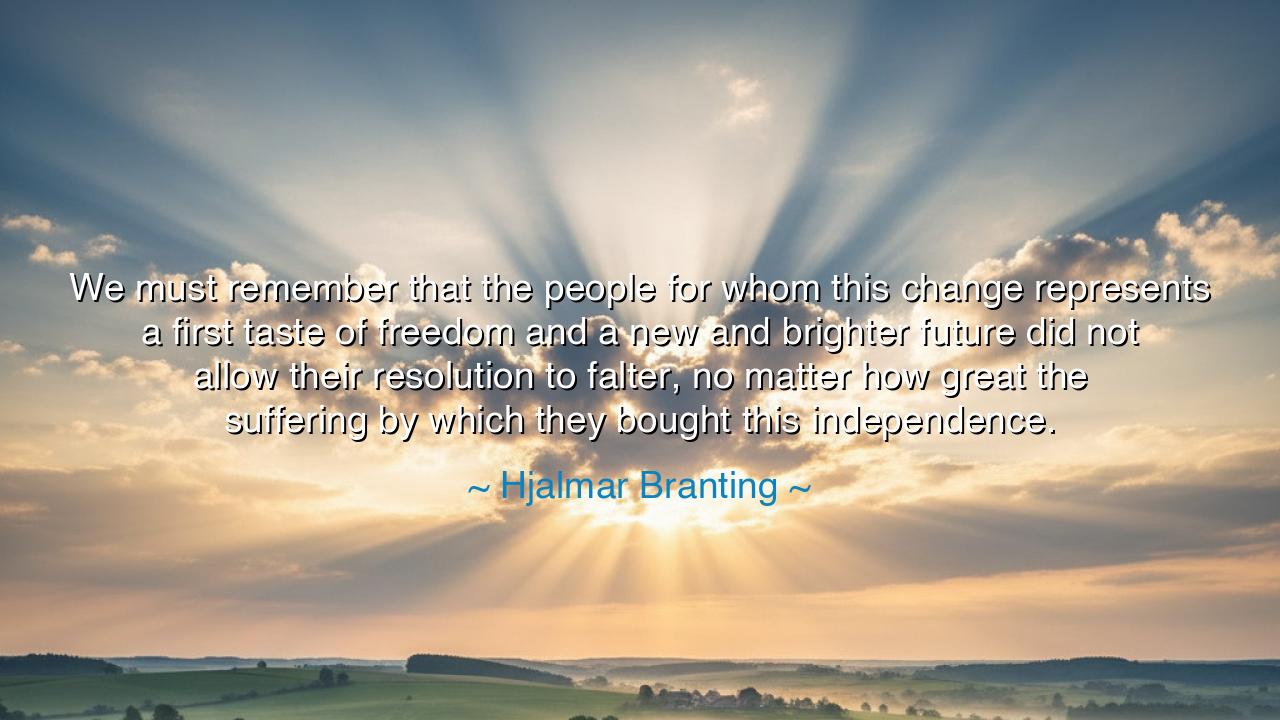
We must remember that the people for whom this change represents
We must remember that the people for whom this change represents a first taste of freedom and a new and brighter future did not allow their resolution to falter, no matter how great the suffering by which they bought this independence.






Hear the solemn and stirring words of Hjalmar Branting, the Swedish statesman and Nobel laureate who once said: “We must remember that the people for whom this change represents a first taste of freedom and a new and brighter future did not allow their resolution to falter, no matter how great the suffering by which they bought this independence.” These words were born in an age of upheaval and rebirth, when nations and peoples were rising from centuries of oppression. They are not the boast of victory, but a reverent remembrance of sacrifice, endurance, and the sacred price of freedom.
In these words, Branting reminds us that independence is not a gift bestowed by fortune—it is a treasure wrested from the grip of suffering. He speaks of those who, in their hunger for liberty, endured hardship, exile, and even death. To them, freedom was not an abstract ideal, but a light glimpsed through the smoke of despair. And when that light finally broke upon them, it was not with the ease of dawn, but with the pain of fire. For every revolution, every emancipation, every victory of the human spirit is paid for in struggle, and Branting calls us never to forget the cost that others bore so we might walk upright today.
This truth is as old as civilization itself. Recall the Greeks, who rose against the might of Persia to defend the fragile seed of democracy; recall the Americans, who endured years of blood and hunger to forge a republic from rebellion; recall the Poles, the Finns, and the Baltic peoples, whose struggles for independence in Branting’s own time stirred the conscience of Europe. He spoke as one who had seen nations rise from ruin—his words reflecting the triumphs and tribulations of those newly freed after the First World War, when the map of Europe was redrawn by courage and by pain.
In every such struggle, Branting reminds us, the true victory lies not in the treaties or borders that follow, but in the resolution of the people—their unbroken will. For the conqueror can shatter armies, but not the spirit of a people who know why they suffer. When men and women cling to their cause through hunger and cold, through loss and despair, they become more than citizens—they become the foundation of a nation’s soul. Independence, once won, is only as strong as the memory of that resolve. Forget it, and liberty becomes fragile; remember it, and it endures through every storm.
Let us think of India, whose people, led by the quiet strength of Mahatma Gandhi, endured years of imprisonment, violence, and humiliation under colonial rule. Their freedom was not born in a single battle, but in countless acts of patience, courage, and faith. The salt march, the hunger strikes, the peaceful defiance—all these were the labor pains of a new nation. And when at last independence came, it was not without scars. But those scars were sacred, for they reminded India of the suffering by which its freedom had been purchased—suffering borne not in vain, but in hope.
Thus Branting’s words carry a timeless admonition: do not grow forgetful. The comfort of peace must never make us blind to the price of its purchase. The ancients would have said that gratitude is the guardian of virtue; Branting says the same in modern form. The people who endured for freedom must never be forgotten, nor must we take lightly the liberty they secured. For the moment we forget the courage of those before us, we risk losing what they bought with their blood.
And so, the lesson is this: honor the past not by mourning it, but by living worthy of it. Let every generation renew the resolve of its ancestors—to cherish freedom, to defend it, and to extend it to others who still struggle in darkness. Remember that independence, once gained, is not a final victory but a daily responsibility. The flame of liberty burns only as long as hands continue to shield and feed it.
Therefore, as Branting urged, let us remember the people who would not let their resolution falter, no matter the suffering. Their strength is the inheritance of us all. Let us carry it forward with humility and purpose, knowing that freedom once lost is not easily regained—and that to keep it alive, we too must be ready to endure, to sacrifice, and to stand unyielding for the sake of a brighter future.






AAdministratorAdministrator
Welcome, honored guests. Please leave a comment, we will respond soon